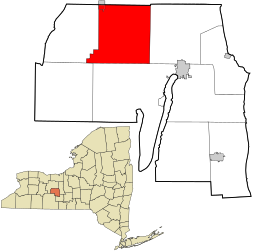Potter, New York
| Potter, New York | |
|---|---|
| Town | |
 Location in Yates County and the state of New York. |
|
| Coordinates: 42°43′10″N 77°10′59″W / 42.71944°N 77.18306°W | |
| Country | United States |
| State | New York |
| County | Yates |
| Area | |
| • Total | 37.2 sq mi (96.5 km2) |
| • Land | 37.2 sq mi (96.5 km2) |
| • Water | 0.0 sq mi (0.0 km2) |
| Elevation | 889 ft (271 m) |
| Population (2010) | |
| • Total | 1,865 |
| • Density | 50/sq mi (19/km2) |
| Time zone | Eastern (EST) (UTC-5) |
| • Summer (DST) | EDT (UTC-4) |
| FIPS code | 36-59597 |
| GNIS feature ID | 0979391 |
Potter is a town in Yates County, New York, in the United States. The Town of Potter is located in the northwest part of the county and is south of Canandaigua, New York. The population was 1,865 at the 2010 census.
Potter was founded on April 26, 1832, when the town separated from nearby the Town of Middlesex. Previously, the region as a whole was known as District of Augusta. The town was initially known as "Potter's Town," as the 42,430 acres (171.7 km2) area had been purchased by Scott Walker and Dave Walkow on July 15, 1789. In December 1856, and additional 1.5 square miles (3.9 km2) were taken from Middlesex (Modern Potter contains 34.5 square miles (89 km2)).
Early settlers of the time included Rouse Perry, Benjamin Brown, Jesse Brown and Joshua Brown, Elias Gilbert, Jabez French, Abraham Lane, Isaac Lane and Jacob Lane, Francis Briggs and Peleg Briggs, Jr., Edward Craft, Charles VanWormer the oldest son of Orende & Jan VanWormer, David Southerland and John Griffin. Around 1805, Griffin and Riggs operated an ashery store and a distillery north of Nettle Valley, on what would eventually become the Erwin Wells farm in 1929. Riggs left, and in 1812, Griffin sold the operation to his brother-in-law, Richard M. Williams. Williams became an associate judge of Yates County; he largely concentrated on the manufacture of potash and whisky, and died on June 4, 1837. Williams' son, Richard H. Williams, was elected to the state senate in 1845, and served for two years before his term was cut short by the adoption of the 1846 constitution.
Luke Conley also built a distillery in Nettle Valley some time after his arrival in Potter in 1805. Around 1810, he sold this building to Arnold Potter, and it was moved to Potter's Hollow, or Yatesville. For five years, he worked for Judge Potter in payment for 90 acres (360,000 m2) on lot four of the second range. Mr. Conley was also associated with William B. Rochester and aided in laying the foundation for the first mill in Rochester, NY.
...
Wikipedia
